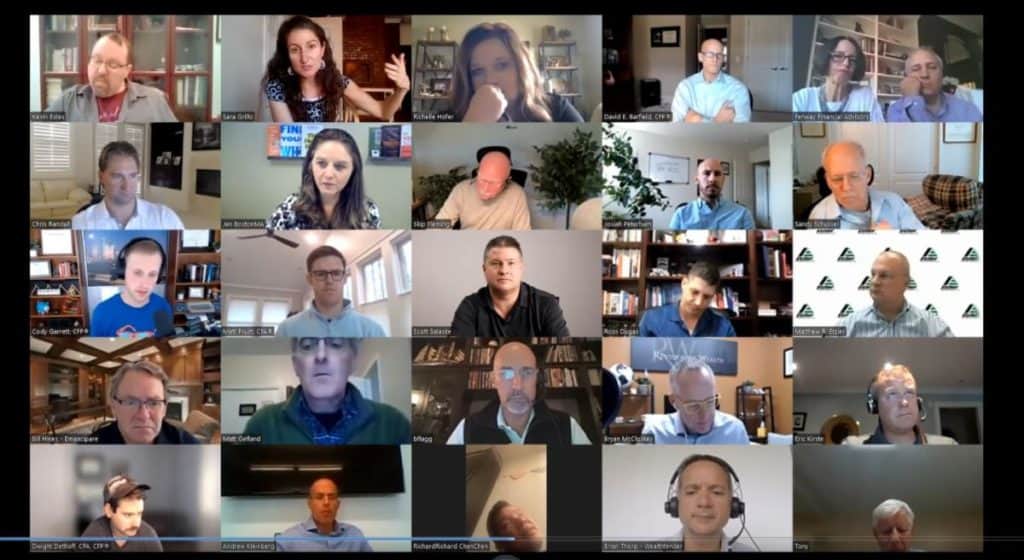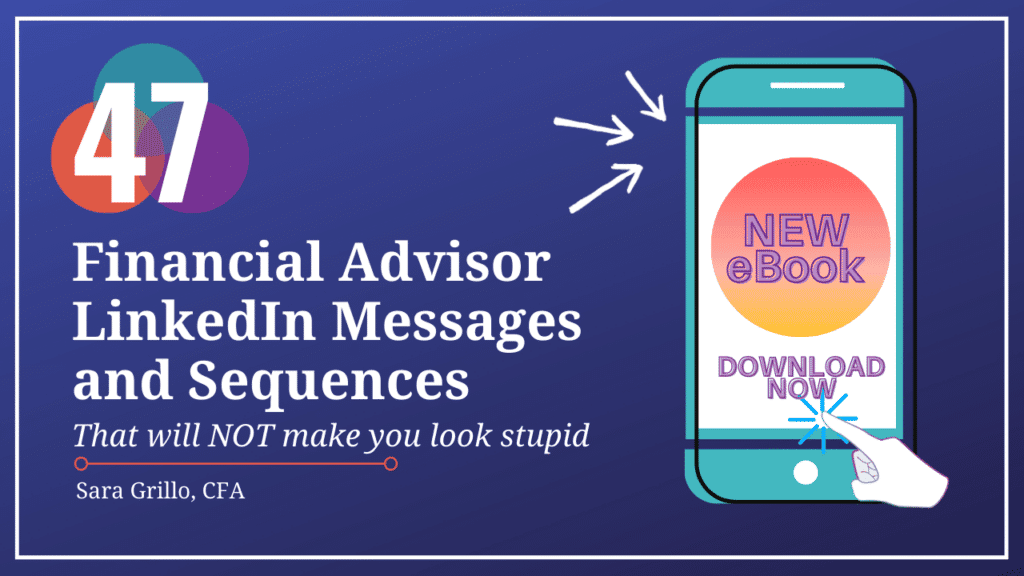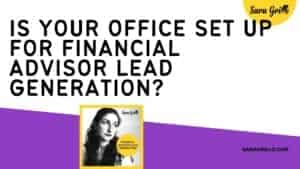Podcast: Play in new window | Download
I’ve come to rescue you from the terrible financial advisor jobs pitched at you by recruiters at wirehouse, bank, and insurance company “training programs.” RUN AWAY. If you are a new advisor or are looking to get into the industry, listen to the story of Jon Luskin. His smart career decisions after university allowed him to avoid the being tortured and exploited in a wirehouse, bank, and insurance company financial advisor program. Instead, he got his first job at a fee only RIA firm instead which worked out brilliantly for him!
For those of you who are new to my blog/podcast, my name is Sara. I am a CFA® charterholder and I used to be a financial advisor. I have a weekly newsletter in which I talk about financial advisor lead generation topics which is best described as “fun and irreverent.” So please subscribe!
Financial advisor training programs rot – don’t do it!
Maybe a quota-driven sales role was the only way for financial advisors to get into the industry in the past- but times have changed and new financial advisors may way more options. Disappointingly, though, many aren’t pursuing these new options and instead falling into the same traps that so many have before.
The old way of getting into the industry – through a training program by a wirehouse, bank, or insurance company – leaves much to be desired. For clarity as to why, watch this video below or read my blog on why selling life insurance rots.
There’s no clearer way to say it: financial advisor training programs rot. Stay away from them. Try this route instead and go get yourself a nice Paraplanner or Client Service Associate role at an RIA firm.
My nightmare of an experience
I had a 10 month old baby, and I was pregnant with my second. I saw this financial advisor job on the internet that I thought was cool.
I responded to the ad and was contacted by a recruiter who assured me that, although the pay was low, only $2-3k a month during the initial period, if I were to pass the milestone and become an official trainee, it would potentially be more.
Just like a drug dealer, she had a great pitch. She sucked me right in with some spiel that they wanted more women advisors, and that they’d be willing to support my needs as a mother, work life balance, ja ja ja.
I was such a sucker back then, I fell for it. I really believed they cared about what happened to me.
They did NOT.
Well, I did great at first, but once I had the baby it just fell apart. I couldn’t take more than a week maternity leave. I had to nurse and be up all night and then go in and fill out insurance applications during the day (you can’t do this remotely). I couldn’t go to in person meetings with my baby and I couldn’t afford daycare for TWO kids now I had, on the limited salary (which I was led to believe was going to be way more).
There was one night I couldn’t sleep. The pressure was giving me a migraine. The stress destroyed my zest for the role. I went in and quit, and they STILL didn’t want to let me go. They still persisted with this BS line of how good I was and how they believe in me.
Again, they had the best “lines.” They said they wouldn’t have picked me if they didn’t think I could succeed. (LIE!!!) Well then why wouldn’t you chalk up some dough so I could afford my life, to actually afford to go to work?
Look, I realize everyone has different experiences at these financial advisor jobs – but I don’t think my experience was a total fluke. Many financial advisor trainees flunk out of these programs after three months of selling their close friends and relatives all the crap products they tell you to hawk to meet the quota so you can make more than the $2k or even worse nothing you are earning. And the worst part is that the “house” then gets to keep those accounts and continue to earn trailing charges or retainer fees or whatever fees on YOUR relationships after you’re fired.
The issue was that I never really set the right path for myself, one with the right setting, people, and resources, one that aligned with my morals.
But there are success stories of financial advisors who did – like the one I’m about to tell.
Jon Luskin – a success story
Jon took a different, much more intelligent, route than I did.
- He knew exactly what he wanted. He was very intentional about his decision to enter the profession as a paraplanner, and he didn’t bend. He patiently worked at it until he found the job he wanted instead of abandoning his intentions for a sales job that, like my experience described above.
- He conducted research before getting into the industry and found out about its bad sales reputation, and found out that it wasn’t what he wanted to do. He was intent on having a service-oriented rather than sales-oriented job.
- He networked through his local FPA chapter. This provided him with insight as to the ways of the industry and the different roles available.
- He networked intelligently. He approached financial advisors by asking them to share their experiences with him and asking for advice as someone starting out in the field, almost as if they were mentors. He didn’t beg them for a job. Many of them reached out a few years later offering jobs.
After working a few years in the industry, he found a mentor – and a good one at that. It was Rick Ferri, an hourly financial advisor. By that point Luskin had evolved through a few paraplanner roles and had moved up into a senior advisor role. From there he struck out on his own as an hourly financial advisor.
The knowledge gap
The sales roles in this industry overshadow the good financial advisor jobs such as Paraplanner or Client Service Associate which are both very good starting off points from people looking to become a financial advisor. The million dollar marketing budgets of the big firms allow them to dominate Google, so that effectively whenever somebody searches on the words, “financial advisor jobs”, the search engines return entries talking about the crap training programs mentioned above.
So here’s some knowledge to fill in the gap.
Client Service Associate
Supports the front-facing work that the financial advisor does such as opening accounts, processing paperwork, etc.
Paraplanner
These roles are usually part administrative, part financial planning. From here you can move into a more senior planning role. This was the path that Luskin took before branching out on his own.
My point here is that there are other roles you can get, for a salary that will allow you to not have to eat cat food. So stop thinking that a commissioned sales role is the only way you can become a financial advisor!
There are probably even more roles than this – do your research like Luskin did!
How to become a financial advisor
To summarize, here is my advice for new financial advisors, career-changers, or anyone looking to become a financial advisor.
- Use your local FPA chapter, and especially if they have a “Next Gen” cohort
- Get a mentor with morals and values that are strong, and make sure the person knows how to build a business the way you would using modern methods (using social media not cold calling for example)
- Network on LinkedIn in a way that is modest and humble not like you are selling washing machines
- Read blogs and follow influencers such as Cody Garrett, Rick Ferri, and Andy Panko, all of whom I have interviewed on this podcast.
- Set yourself up in college by pursuing financial planning related courses
- Moonlight or get gigs to avoid desperation when you are starting out to avoid making decisions out of desperation
- Do a financial plan for yourself when you are starting out to avoid making decisions out of desperation
- Get as big a runway as possible and allow yourself as much time as you can to progress naturally to avoid desperation
Sara’s upshot on financial advisor jobs
What’d ya think of my blog on financial advisor jobs? Was this helpful?
If yes…
Join the Transparent Advisor Movement. Learn more about it in this video:
Join the Transparency Advisor Movement.
The Transparent Advisor Movement’s mission is to promote ideals of clarity, modesty, integrity, dignity, and client advocacy in all aspects of financial advice, with a special focus on Advice Only, Flat Fee, and Hourly service models. There is a special emphasis on clear disclosure of services and their related fees.
The Transparency Movement is the future of the industry – we welcome anyone who believes in our values to join us.

Join our next Transparent Advisor virtual meetup.

These meetups are free and the goal is to learn from each other about how to grow and manage a transparent practice for the benefit of clients.
Even if you can not make the meetup, or even attend in its entirety, please register for the replay and to be notified of the next one.
Or if you are looking to market yourself better…
Learn what to say to prospects on social media messenger apps without sounding like a washing machine salesperson. This e-book contains 47 financial advisor LinkedIn messages, sequences, and scripts, and they are all two sentences or less.

You could also consider my financial advisor social media membership which teaches financial advisors how to get new clients and leads from LinkedIn.

Thanks for reading. I hope you’ll at least join my weekly newsletter about financial advisor lead generation.
See you in the next one!
-Sara G





